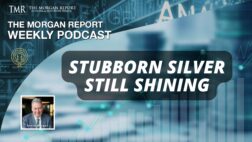Recently, I was interviewed on the Fox Business Channel regarding the Utah Legal coin act. Here is a little background and some interview questions…For the first time since 1971, gold and silver are once again considered legal tender in at least one part of the United States. The state of Utah passed the “Utah Legal Tender Act,” which “recognizes gold and silver coins that are issued by the federal government as legal tender in the state and exempts the exchange of the coins from certain types of state tax liability.”
The law, signed by Governor Gary Herbert on March 25, is voluntary system that provides an alternative to the fiat-based Federal Reserve note that are created out of thin air in unprecedented proportions.
The most significant change from a practical perspective is that the Utah’s state tax code now considers gold and silver coins issued by the U.S. Mint as currency rather than an asset, which means since it is considered money it cannot taxed. However, federal taxes still apply on these transactions.
1. What is this Utah Legal coin act about?
The Utah Legal Tender Act (HB 317) is designed to reinstate gold and silver coin as an optional medium of exchange in Utah intrastate commerce. The bill recognizes the inherent and inalienable right of citizens to voluntarily employ these time-tested, inflation-proof, complementary currencies to foster economic development throughout the state. The bill draws its authority from Article1, Section 10 of the United States Constitution which provides that no state shall make anything but gold and silver coin a tender for payment of debts. Grounded in long-standing principles enshrined in the supreme law of the land, this statute addresses current, pressing monetary issues in modern American society – issues to which gold and silver coin solutions are uniquely suited.
2. Why do we sound need money?
Because the founders of our nation had experienced first hand the ills attendant unbacked fiat currency, they provided in Article 1, Section 10 of the United States Constitution that no state is to make anything but gold and silver coin tender for payment of debts. Unfortunately, we’ve departed from the wisdom they imparted, and embraced a medium of exchange which has no intrinsic value whatsoever. The value of today’s dollar is upheld by governmental edict, backed only by the indebtedness of our nation and its citizens. Because of sharp increases in our money supply, our national debt is on an upwards trajectory set shortly to eclipse our gross domestic product. Since there is no historical precedent for a totally fiat money system, such as ours, ever lasting more than a few decades, prudence dictates that alternative, sound, means of exchange be put in place well in advance of any potential crisis, such as those endured by the fiat-financed nations and empires of the recent and distant past.
Even absent the specter of catastrophic consequences, an alternative sound money system confers many benefits on citizens and state governments alike. Such a system serves as a refuge from the ills fiat money produces, including the insidious “inflation tax” that our current monetary system imposes. Consider that the U.S. dollar has lost more than 95% of its purchasing power since decoupling from gold and silver backing. By contrast, sound money systems of the past continued virtually inflation proof for centuries on end.
3. Are there other states that are looking at something similar?
Virginia House Joint Resolution 557
Georgia Constitutional Tender Act
Ohio Honest Money Project
Idaho Silver Gem Act, Bill No. 633
South Carolina House Bill No. 4501
Missouri House Bill No. 561
Washington House Joint Memorial 4010
Colorado Honest Money Act (HB09-1206)
Indiana Senate Bill No. 453
Montana House Bill No. 639
New Hampshire Gold Money Bill 1. 1.
4. Why are the states doing this and not the Federal Government?
Because of the co-dependent relationship between Congress and the Federal Reserve, the likelihood of any sound money reform coming out of Washington is remote indeed. Individual states, exercising their sovereign authority, are best equipped to restore sound money to its prior status as a trading currency. So look for a sound money come back on a state by state basis. It makes sense to first support states that are well positioned to make sound money a reality today. Then as the movement gains momentum, reluctant jurisdictions will see the advantages of embracing sound monetary systems
There are many questions that cannot be answered in this interview.
For those interested please go to www.utahsoundmoney.org
This website will have the answer to most questions we have not covered today..
David Morgan
The law, signed by Governor Gary Herbert on March 25, is voluntary system that provides an alternative to the fiat-based Federal Reserve note that are created out of thin air in unprecedented proportions.
The most significant change from a practical perspective is that the Utah’s state tax code now considers gold and silver coins issued by the U.S. Mint as currency rather than an asset, which means since it is considered money it cannot taxed. However, federal taxes still apply on these transactions.
1. What is this Utah Legal coin act about?
The Utah Legal Tender Act (HB 317) is designed to reinstate gold and silver coin as an optional medium of exchange in Utah intrastate commerce. The bill recognizes the inherent and inalienable right of citizens to voluntarily employ these time-tested, inflation-proof, complementary currencies to foster economic development throughout the state. The bill draws its authority from Article1, Section 10 of the United States Constitution which provides that no state shall make anything but gold and silver coin a tender for payment of debts. Grounded in long-standing principles enshrined in the supreme law of the land, this statute addresses current, pressing monetary issues in modern American society – issues to which gold and silver coin solutions are uniquely suited.
2. Why do we sound need money?
Because the founders of our nation had experienced first hand the ills attendant unbacked fiat currency, they provided in Article 1, Section 10 of the United States Constitution that no state is to make anything but gold and silver coin tender for payment of debts. Unfortunately, we’ve departed from the wisdom they imparted, and embraced a medium of exchange which has no intrinsic value whatsoever. The value of today’s dollar is upheld by governmental edict, backed only by the indebtedness of our nation and its citizens. Because of sharp increases in our money supply, our national debt is on an upwards trajectory set shortly to eclipse our gross domestic product. Since there is no historical precedent for a totally fiat money system, such as ours, ever lasting more than a few decades, prudence dictates that alternative, sound, means of exchange be put in place well in advance of any potential crisis, such as those endured by the fiat-financed nations and empires of the recent and distant past.
Even absent the specter of catastrophic consequences, an alternative sound money system confers many benefits on citizens and state governments alike. Such a system serves as a refuge from the ills fiat money produces, including the insidious “inflation tax” that our current monetary system imposes. Consider that the U.S. dollar has lost more than 95% of its purchasing power since decoupling from gold and silver backing. By contrast, sound money systems of the past continued virtually inflation proof for centuries on end.
3. Are there other states that are looking at something similar?
Virginia House Joint Resolution 557
Georgia Constitutional Tender Act
Ohio Honest Money Project
Idaho Silver Gem Act, Bill No. 633
South Carolina House Bill No. 4501
Missouri House Bill No. 561
Washington House Joint Memorial 4010
Colorado Honest Money Act (HB09-1206)
Indiana Senate Bill No. 453
Montana House Bill No. 639
New Hampshire Gold Money Bill 1. 1.
4. Why are the states doing this and not the Federal Government?
Because of the co-dependent relationship between Congress and the Federal Reserve, the likelihood of any sound money reform coming out of Washington is remote indeed. Individual states, exercising their sovereign authority, are best equipped to restore sound money to its prior status as a trading currency. So look for a sound money come back on a state by state basis. It makes sense to first support states that are well positioned to make sound money a reality today. Then as the movement gains momentum, reluctant jurisdictions will see the advantages of embracing sound monetary systems
There are many questions that cannot be answered in this interview.
For those interested please go to www.utahsoundmoney.org
This website will have the answer to most questions we have not covered today..
David Morgan



